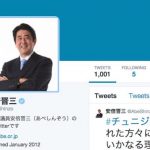 The use of bot factories to influence political proceedings has been in the spotlight recently, not least due to the ongoing investigation into alleged collusion between the Trump campaign and Russia. There are also suggestions that social media has created an echo chamber whereby people filter themselves off into likeminded communities and fail to expose themselves to diverse opinions.
The use of bot factories to influence political proceedings has been in the spotlight recently, not least due to the ongoing investigation into alleged collusion between the Trump campaign and Russia. There are also suggestions that social media has created an echo chamber whereby people filter themselves off into likeminded communities and fail to expose themselves to diverse opinions.
A recent paper sets out to explore the use of social media in political discourse more closely. The researchers examined Twitter usage during the Japanese elections in 2014. They were able to identify the activity patterns of Twitter bots, and indeed their influence on the electorate.
The election, which was won by Shinzo Abe, largely revolved around economic issues in the mainstream media, but the debate on social media took a very different tenor.
“Our analysis showed that Abe’s hidden nationalistic agenda had a very important role to play in these channels,” the authors explain. “The importance of the hidden agenda in social media is not, however, down to either the prime minister or the LDP itself.”
Enthusiastic supporters
Instead, it seems that the social bot activity was largely the work of right-wing Internet users themselves to give indirect support to Abe’s nationalistic agenda, which was largely relegated to a sub-plot during the campaign itself.
The team analyzed over 540,000 tweets posted both before and after the elections. This analysis uncovered a high number of tweets that appeared either identical or very similar. They used corpus linguistics to determine whether these tweets were the result of bot activity or not.
The work reveals that the tweets could be traced back to just 3,722 original messages that were then ‘amplified’ via retweets or close duplicates by the bot network.
This activity followed five distinct patterns, three of which were pro-LDP, one of which was for another right-wing group and the final for users who act similarly to bots.
“Tweets in the first and second groups use similar language, reflecting the jargon often used in right-wing internet circles, and tend to include racist or hostile remarks,” the researchers explain.
Further investigation revealed that the tweets originated from two right-wing Internet activist groups. They used their bot network to spread extremely nationalistic content, with accusations of being anti-Japanese commonly used to try and convert more moderate people to the cause.
“This bridge connected the nationalistic discourse of the right-wing internet activists with Abe’s right-wing conservative agenda. As a result, Abe’s position was not only supported by the conservative organisations of a group of users with close links to the LDP but also by the large, although not well organised, group of right-wing internet activists,” the authors say.
Even though these groups weren’t explicitly supporting Abe, the similarity in their positions undoubtedly helped his cause.